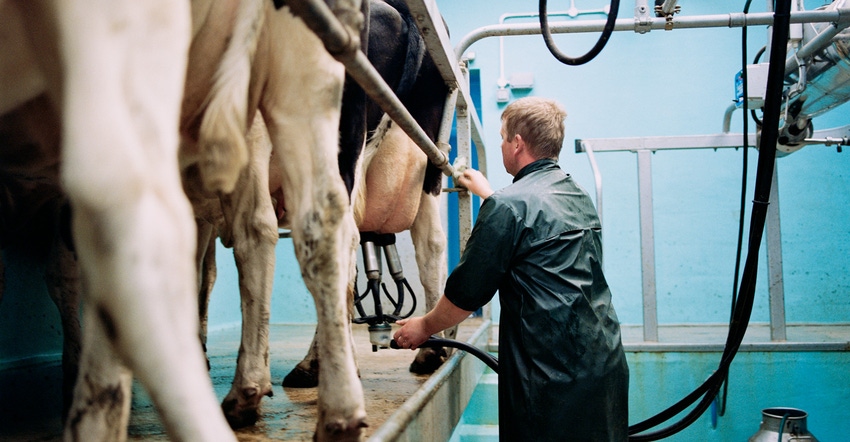
Making sure handwashing stations are stocked with soap and having plenty of hand sanitizer around may not have been high on the to-do list for some dairy farmers, but that was before COVID-19 hit.
Now, these are vital to keeping farmworkers healthy and letting them know that the farm owner is serious about the situation.
“This is a really stressful time for everyone, and people working on your dairy will be looking to you for help,” said Rich Stup, Cornell University’s ag workforce development specialist, during a webinar on COVID-19 and its effects on dairy farms.
While always important, proper cleanliness and hygiene on the farm is even more important now, especially if the farm has H-2A workers and they must provide housing for workers.
“The reality is if you own the housing and are providing it, you are responsible for maintaining and managing it,” Stup said. “This is the time to make sure the housing is being cleaned and that the workplace is being cleaned.”
Stup said farmers should set up regular cleaning schedules with assigned responsibilities for workers. The Centers for Disease Control and Prevention, the Occupational Safety and Health Administration, and the Cornell Agricultural Workforce Development program have resources for cleaning and disinfecting the workplace and workplace housing.
Don’t ‘tough it out’
While most farmers when they get sick would rather work through it to get things done, COVID-19 is a different animal.
“All recommendations call for sick people to stay home,” Stup said. “This is not a good time to tough it out. If you're sick, stay home and deal with it. You can turn an individual problem into a workforce disaster in a hurry.”
The government has approved new paid sick leave requirements for COVID-19, including expanding, at least temporarily, the Family and Medical Leave Act (FMLA) for businesses with 500 or fewer employees, though small businesses with 50 or less employees are exempt if it “jeopardizes the business.”
The expanded FMLA provides 12 weeks of job-protected leave. The first 10 days an employee can use accrued sick or vacation pay; after 10 days, the employer is required to pay full-time employees two-thirds of their regular wage.
Businesses with 25 or more employees must hold the same job or an equivalent job for an employee who is out on emergency FMLA; however, businesses with 25 or less employees are excluded if the employee’s position is no longer available due to an “economic downturn” or other circumstances stemming from the current COVID-19 situation.
New York Farm Bureau’s website has a summary of the FMLA and sick leave changes, as well as available tax credits for employers to help them defray the cost. Cornell Workforce Development has a summary of New York-specific sick leave rules available online.
Keeping distance from others
Stup said that isolating a sick employee, especially one that must be housed on the farm, should be part of a farm’s crisis management plan.
He said that farm owners should think about possible places to put a sick employee, including an unused or available house, or even an RV.
Rob Lynch, dairy herd health and management specialist with Cornell’s Pro-Dairy program, said farmers should minimize face-to-face interactions with delivery people, technicians or anyone else who regularly visits the farm.
Postponing staff meetings is a good idea, he said.
Farmers should also create a visitor log to record the names of people who have visited, where they have gone while on the farm and whom they have visited with. This will enable traceback of anyone who has been contact with someone who is sick.
Lynch said that most milk haulers are minimizing contact during the COVID-19 crisis. He said that farmers should clean and sanitize surfaces touched by milk haulers as well as make disposable gloves available and keep highly trafficked areas stocked with soap and towels.
When it comes to deliveries, Lynch said farmers should create a designated drop-off location and waive requirements for package signatures to limit interaction.
Limited support services available
Stup said that most sale barns are open and operational but limiting attendance to just registered buyers and employees. DHIA services are also continuing, he said, though they are limiting lab access to only essential personnel.
While veterinary services are considered “essential businesses,” Stup said they may be operating with reduced services and are postponing services that are noncritical.
Reporting COVID-19
If you have a suspected case of COVID-19 on the farm, Stup said the first step is to call the state or county health department.
If the employee is visually sick, send them home. The CDC is recommending anyone who is sick from COVID-19 to stay home, stay in touch with a doctor and stay away from others.
“And remember to communicate health issues with anyone coming onto the farm,” he said.
Lynch said employees should be cross trained to perform multiple jobs just in case another employee gets sick. Some things such as team meetings, farm tours and sales visits should likely be discontinued temporarily.
If it can be done, reducing the number of milkings might be an option if there aren’t enough employees available.
“We don't really want to impact our performance because that's what keeps the business going. At the same time, think about things that if not fixed or addressed would affect the performance of the business,” he said.
If the farm manager or farm owner gets sick, Stup recommended assigning temporary management responsibilities to a designated next-level employee, or even bringing in an outside manager to run things temporarily.
Earlier this week the Pennsylvania Center for Dairy Excellence released COVID-19 guidelines for dairy farms.
Included in those guidelines was having worker travel letters handy for employees in case any “shelter in place” order is issued. This can be critical to allow employees to go back and forth from the farm, but it is important to download a letter template and be sure to incorporate the farm letterhead.
About the Author(s)
You May Also Like






